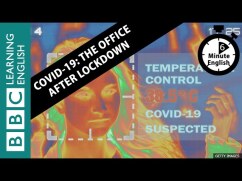Going to the Post Office.pdf
Going to the Post Office.mp3
COMPLETE TRANSCRIPT
Welcome to English as a Second Language Podcast number 14 – Going to the
Post Office.
This is English as a Second Language Podcast episode 14. I'm your host, Dr.
Jeff McQuillan, coming to you from the Center for Educational Development in
beautiful Los Angeles, California.
On this podcast, we’re going to go to the post office. Let's get started.
[start of story]
For me, things never go very smoothly at the local post office. I've learned that if
you want to mail a letter, you'll have no problems. But if things get more
complicated than that, well, watch out!
Yesterday I went there to mail a small package and pick up a book of stamps. I
wait my turn in line, and when I get up to the window, the clerk says, "What can I
do for you?" "Well," I say, "I need a book – no make that a roll – of stamps. And I
need to send this package priority to San Francisco." "You want insurance with
that?" he asks me. "Uh, I don't know, what do you recommend?" "Well," he says,
"you can send it priority with tracking if you want to see when it gets there, you
can send it insured if the contents are valuable, or you can do both."
"Okay, I'll take the insurance." "Then step aside to fill out the insurance form," he
says, "and bring it back up to me when you're finished." With that, I was waved
aside to fill out my form. "Next in line!" the clerk calls. When I finish filling out the
form, I wait patiently until the gentleman being waited on in front of me is
finished, and then step back up to the window. "Sorry," the clerk says, "I'm on
break now. She can help you at the next window."
Maybe it would be quicker just to drive my package to San Francisco.
[end of story]
In talking about my trip to the post office I said that, “Things never go very
smoothly.” “To go smoothly” (smoothly) means to take place without problems.
For example, if someone asks you, “How did your visit to the doctor go?” You
could say, “Oh, it went smoothly,” meaning I didn't have any problems.
Everything was just fine.
English as a Second Language Podcast
I said that, “If you want to mail a letter at my post office, you'll have no problems.”
“To mail a letter” means to send a letter. A letter is typically a piece of paper
inside of an envelope. “But if things get more complicated,” I say, “well, watch
out.” “Watch out” is an expression we use to mean “be careful.” What I'm saying
here is that if you want to do something other than mail a letter, which is a very
simple thing, then you might have problems.
I continue the story by saying, “Yesterday, I went there to mail a small package
and to pick up a book of stamps.” There are two terms we use in talking about
stamps. One is a “book of stamps” and the other is a “roll (roll) of stamps.” A
“book of stamps” is a small, little book, although it's not really a book. Basically,
it's a small package of about 20 stamps. A “roll of stamps” has a hundred
stamps, but all of the stamps are connected to each other and they’re wrapped
around until they're in a small circle, what we call a “roll.” I said that I wanted to
pick up or buy a book of stamps. I also said I want to mail a small package. A
“package” (package) is something you are sending that is bigger than a simple
letter with an envelope. A package is usually in a box, a small box, a large box –
any kind of box. You send a package when you are sending something, usually
larger than can fit into a small envelope. Then I began to tell the story of what
happened exactly at the post office.
When we tell a story in English, we many times, use something called the
historical present, which is the present tense of the verb, even though you are
talking about something in the past. “Historical” comes from “history” – something
that has happened already. Even though I'm describing something that happened
in the past, in this case, it was yesterday, I still use the present tense in telling the
story. The idea is that, it gives it a little more immediacy. It feels like it's
happening right now.
So, in telling the story, I begin by saying, “I wait my turn in line.” “To wait your
turn in line” means to wait for the person in front of you or the people in front of
you, to go first. If there is a line, you have to wait for the people in front of you
who arrived before you did. I say, “I wait my turn in line and when I get up to the
window, the clerk says to me, “What can I do for you?’’ The “window” here is not
a window on the side of a building or a house that you look outside through. A
“window” here just means the place where the person working for the post office,
the clerk, stands in order to help you. You go up to this person who’s standing
usually behind what we would call a “counter.” It’s basically a large, narrow desk.
You have one person on one side, the clerk, the employee of the post office and
you're on the other side doing what you are there to do – buying stamps or
sending packages and so forth.
English as a Second Language Podcast
So, I walk up to the window and the clerk asks me “What can I do for you?” This
is just a nice way of saying, “How can I help you?” I say “I need a book – no,
make that a roll – of stamps.” The expression, “make that” means change what I
just said. So, when I say “I need a book – no, make that a roll – of stamps” I
mean that I just made a mistake. I didn't mean to say a “book of stamps.” I meant
to say, a “roll of stamps.” So, it's a way of correcting yourself as you are
speaking.
I say that, “I need a roll of stamps and I need to send this package priority to San
Francisco.” “Priority” is one way of sending a package in the United States. It
depends on how fast you want your letter or package to arrive somewhere. There
are many different ways of sending letters and packages. The faster it gets there,
the more expensive it is. The most common way of sending mail is what we call
“first class mail.” There's nothing special about it. It'll get there, oh, depending on
how far away the place you are sending it to, in a couple of days. If you sent
something Priority, usually, that means it will arrive in two to three days, even if
it's on the other side of the country. For example, if I send a package from Los
Angeles to New York first class mail – regular mail, it may take up to a week to
arrive. But, if I send it Priority Mail, it will arrive in two to three days. The fastest
way of sending mail is “Express.” “Express” usually arrives the next day. I'm
sending this package Priority to San Francisco.
The clerk then asked me, “You want insurance with that?” Notice the informal
way he asks this question. The correct, grammatical way would be, “Do you want
insurance with that?” At least that would be the more formal way of phrasing the
question. He instead says, “You want insurance with that?” And by raising his
voice at the end, you know he's asking a question. I say “Uh, I don't know. What
do you recommend?” – meaning, “What do you suggest?” He says, “Well, you
can send it Priority with tracking if you want to see when it gets there.” “Tracking”
(tracking) means that you are given a special number and you can go online, you
can go on to the Internet, and check to see when that package arrived, when the
post office employee, who delivers the package – we would call that person the
“postal carrier” – he will enter the day and time that he delivered the package and
you will get that information on the Internet, if you want it. I say we call the person
who delivers the mail the “postal carrier.” We used to call it the “postman,” but
people didn't like the word “man” because there were both men and women and
so they've changed the term to “postal carrier” (carrier).
So, the clerk asked me if I want to send it Priority with tracking or if I want to send
it insured. “To send a package insured” (insured) means that you buy a special
kind of insurance policy. So, if something goes wrong – if the post office loses the
package – you will get money back for your package. You only want to do that if
English as a Second Language Podcast
the contents of your package are valuable. “Contents” refers to what is inside of
the package, what you are actually sending. It could be a bottle. It could be a
shoe. It could be a computer. “Valuable” means that it is worth a lot of money. “I
decide that I'll take the insurance,” meaning I will buy the insurance.
The clerk then says, “Step aside to fill out the insurance form.” “To step aside”
(aside) is a two-word phrasal verb, meaning to move to one side of where you
are standing right now, so that someone else can walk up and be helped. We
would use this expression in a situation like this where you have a line of people
waiting to be helped by a clerk or an employee of some organization. So, I
stepped to one side. I move away from the window, in order to fill out or complete
the insurance form. The clerk says, after I finish filling out the insurance form, I
should bring it back up to him. “To bring it back” means to return it to him. The
clerk then waves me aside. “To wave (wave) someone aside” is another two[1]word phrasal verb. It means to move your arm, move your hand back and forth,
to indicate to the person that you want them to step aside. It's not a very polite
thing to do typically, but it is not uncommon.
I say that “I'm waved aside and then the clerk says, ‘Next in line!’” The clerk is
asking for the next person to walk up to the window in order to be served, in
order to be helped. Then, I finish filling out the form and I wait patiently until the
gentleman – the adult man being waited on in front of me – is finished. “To be
waited” on means that someone is helping you. So, there is a person in front of
me at the window who is being helped by the clerk. I'm waiting for this man to
finish what he needs to do so that I can then be helped when he finishes. I step
back up to the window. That means I walk back up to talk to the clerk. The clerk
says, however, “Sorry,” meaning I'm sorry, “I'm on break now.” “To be on break”
(break) means that you are not working anymore, that you are taking 15 or 20
minutes to relax. In most jobs, if you work more than four hours, you get a break.
You get to stop work in the middle and relax a little. That's what the clerk is going
to do.
He says that the person next to him, at the next window, can help. I end the story
by saying “Maybe it would be quicker” – maybe it would be faster – “just to drive
my package to San Francisco.” I'm saying that it's taking so long to mail my
package, it would be quicker just to drive it from Los Angeles to San Francisco,
which takes about six or seven hours. I’m making a joke, of course.
Now let’s listen to the story, this time at a normal speed.
[start of story]
For me, things never go very smoothly at the local post office. I've learned that if
you want to mail a letter, you'll have no problems. But if things get more
complicated than that, well, watch out!
Yesterday I went there to mail a small package and pick up a book of stamps. I
wait my turn in line, and when I get up to the window, the clerk says, "What can I
do for you?" "Well," I say, "I need a book – no make that a roll – of stamps. And I
need to send this package priority to San Francisco." "You want insurance with
that?" he asks me. "Uh, I don't know, what do you recommend?" "Well," he says,
"you can send it priority with tracking if you want to see when it gets there, you
can send it insured if the contents are valuable, or you can do both."
"Okay, I'll take the insurance." "Then step aside to fill out the insurance form," he
says, "and bring it back up to me when you're finished." With that, I was waved
aside to fill out my form. "Next in line!" the clerk calls. When I finish filling out the
form, I wait patiently until the gentleman being waited on in front of me is
finished, and then step back up to the window. "Sorry," the clerk says, "I'm on
break now. She can help you at the next window."
Maybe it would be quicker just to drive my package to San Francisco.
[end of story]
Thanks to our wonderful scriptwriter, Dr. Lucy Tse, for her wonderful script.
From Los Angeles, California, I'm Jeff McQuillan. Thank you for listening. Come
back and listen to us again right here on ESL Podcast.
English as a Second Language Podcast is written and produced by Dr. Lucy Tse,
hosted by Dr. Jeff McQuillan. T
GLOSSARY
to go smoothly – to happen without any problems or trouble; to be completed
without any problems
Even though Sherri was nervous about her exam, it went very smoothly and*
she passed.
to mail a letter – to send a written note to someone using the mail system (a
system that delivers letters and packages from one person to another)
* Ian lived in Florida and mailed a letter to his friend living in California*
to watch out – to be prepared for something; to be aware
* When Colleen gets angry, her friends know that they need to watch out for her*
angry behavior.
book of stamps – a small booklet with one or more sheets of paper, on which
postage stamps (small stickers showing that the fees to send mail have been
paid) are attached
* Mr. Dooley needed to send a lot of mail, so instead of buying individual stamps*
.he bought a book of stamps
roll – a long, narrow piece of paper on which many postage stamps are attached
* Lorraine had 85 cards that she needed to send, so she bought a roll of stamps*
package – a group of objects placed into a box or other container, often sent to
someone else using the mail system
* When Anton moved to a different city to attend college, he received a package*
.from his family every month
Priority – a type of mail service that delivers documents and boxes from one
location to another in two or three days
* The document was sent by Priority Mail on Monday and arrive at its destination*
on Wednesday
insurance – a small fee paid to ensure that if something does not happen as
expected, one will be paid the value or expenses one has lost
The vase Hae was sending to her friend was fragile and expensive, so she*
bought insurance in case it got damaged in the mail
tracking – a service that updates the sender of a piece of mail about where that
mail is while is being delivered and when it reaches its destination
The tracking indicated that the package reached its destination on Thursday*
contents – the items inside a container; the objects inside of something
The contents of the box had shifted during transportation, so when the box was*
opened, everything was a mess
to step aside – to move away; to move to the side, usually so that someone else
can stand where one was standing
After placing his order, Jake stepped aside so the person behind him could*
order, too
to be waved aside – to be directed to move away from something by someone
with a wave (polite hand gesture)
After the restaurant employee took Ilse’s order, she was waved aside and told*
to wait at the other end of the counter until her food was ready
to be waited on – to be attended to in a place of business; to be helped by an
employee
Fifteen minutes passed before Nigel was waited on by an employee*
to step – to approach; to move toward something
When Rocio’s number was called, she stepped up to the counter to be helped*
on break – while taking a short rest at work; while pausing in one’s work to relax
for a short period of time
Tomas needed to call his wife, but he was at work and had to wait until he was*
on break before he could call









